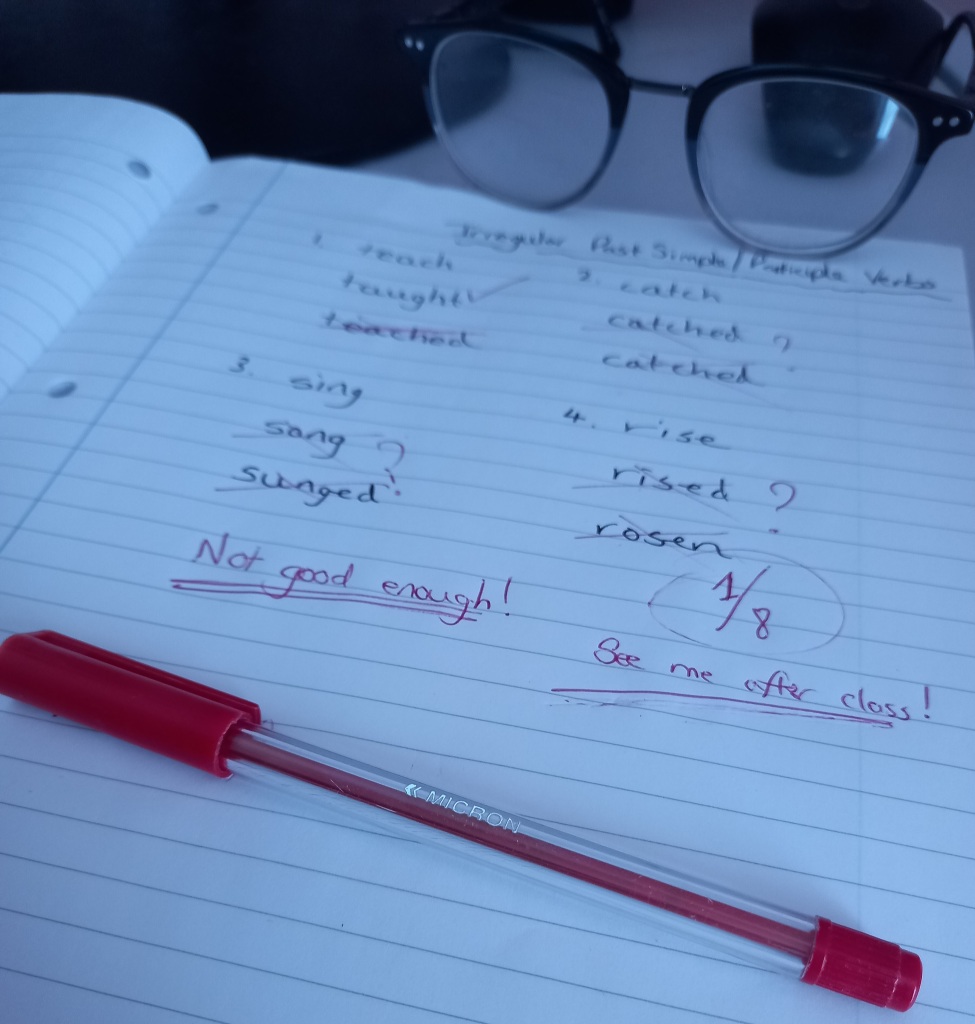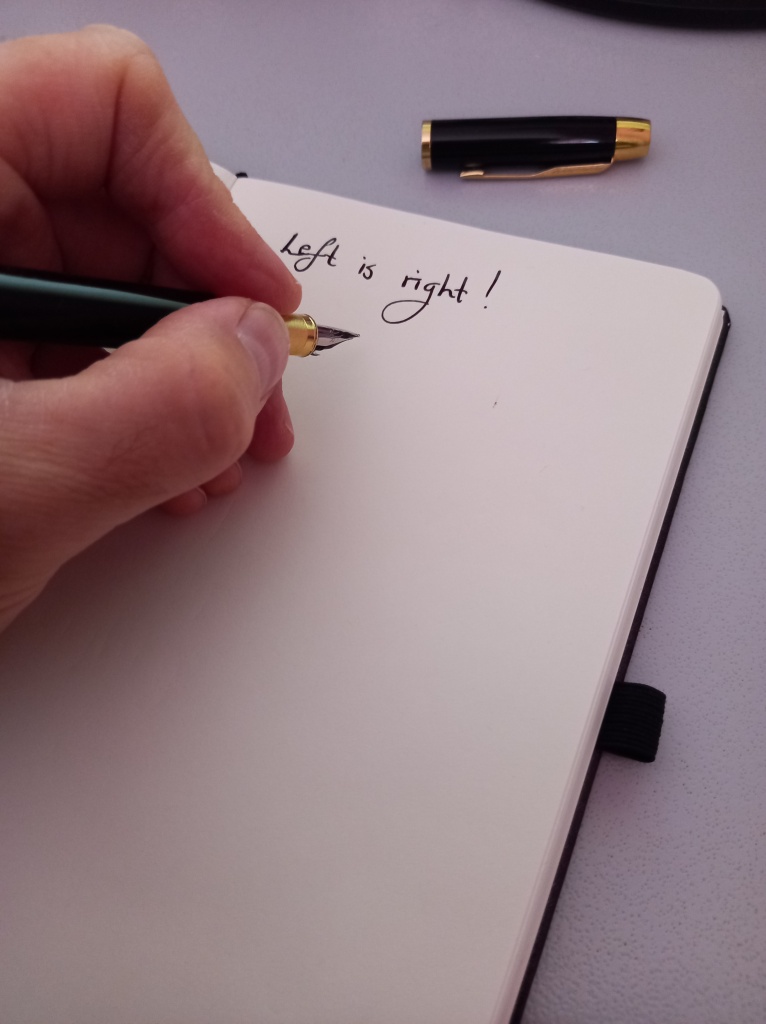
Mistakes. The scourge of the student. The fear of all language learners. A reason for shyness, for feeling inadequate, a reason perhaps to give up.
How many times at school did you receive a test back from your teacher? Over your page is a spider’s scrawl of red ink. INCORRECT. WRONG. SEE ME AFTER CLASS!!!! The fear wells up inside you as you expect to be yelled at, made to feel stupid for getting things wrong and even worse, humiliated in front of your friends and school mates.
Aren’t teachers supposed to be educating, nurturing and developing young minds?Surely the best and most effective way is to create a culture of trust and respect and environment that is conducive to learning. Not one that is borne out of some perverse power and ego trip that puts the teacher as the font of all knowledge, to be obeyed and respected through fear, like some despotic dictator. I still remember teachers at school who I feared being in a classroom with. Fear of their temper, fear of making a mistake and fear of never being good enough.
Then again, I remember even more those teachers who were the opposite. Who garnered respect through encouragement, patience and a willingness to help those who found particular subjects or ideas difficult to comprehend. When you made a mistake, they did not single you out or belittle you. Rather they would go over things again, possibly with the assistance of a more capable student. They would demonstrate, illustrate, provide clear and easy to understand examples, but crucially, they allowed you to try again. And would not scold you for making the same mistake again – but they understood you would eventually get it. Given time and the right environment for learning, all students would be able to understand even complicated theories and ideas – but everyone has a different potential for learning and critically, a different speed at which they can assimilate ideas and develop.
Learning anything is not a linear, equal process. I was excellent at geography, won a school prize in the subject, went on to study it at university. I picked up everything without difficulty (except for scientific equations in geomorphology….my Kryptonite). But put me in front of a physics or chemistry text book and it was like learning Chinese or Arabic or Russian. Like a different alphabet and language altogether. I still struggled, but I had patient teachers who assisted, rather than cajoled and pressured me to learn.

Learning English – Mistakes Are Positive Things
I have now taught English as a Foreign Language for 25 years. And I am confident that every lesson I have taught has contained a myriad of mistakes. From my students, of course. But also inadvertent mistakes by myself. Spelling errors, a mispronunciation with syllable stress, a poorly worded explanation as I could not remember what the word meant (only for a moment or two). But these mistakes are all part of being human. We are not robots, we aspire to but never reach perfection. Mistakes make us human. I would quickly rectify my mistakes and would not hide away from them. If a student pointed out I had accidentally spelled a word wrong (government / environment were always my Achilles heel…n before m please!) I would say, ‘Excellent, well done, you found the deliberate mistake today’ and then go on to say it just shows that
‘Mistakes are normal, to be expected and nothing we need to be ashamed of.’
If I could not think of the correct way to explain a word, or Heaven forbid, I was presented with a word that I was unsure of the meaning of, for example ‘disestablishmentarianism’ I would not try and bluff out some contrived definition. I would say,
‘One moment, let me check in the dictionary. Because that’s what dictionaries are for. To help us out when we don’t know a word. Because, contrary to popular belief, I don’t know EVERY. SINGLE. WORD. in the English language.’
Humanising Mistakes
I have taught students who were so afraid of making mistakes when speaking, that they clammed up entirely and hardly said a word in their first class with me. Despite my best efforts to elicit responses, to encourage and create a friendly, unintimidating atmosphere, they were sometimes just completely overawed. At the end of the class I would ask to talk to them and explain about the ‘importance of making mistakes.’ Sometimes I had to console a student who had broken down in tears. But I always pointed out that
‘If you don’t make mistakes, there is no need for you to be here. You would be speaking perfectly and in no need of English lessons. Mistakes are natural, normal and we all make them. But when you make a mistake, it is my job to identify and help you correct it – and to help you become aware of the mistake, so you learn and hopefully eliminate it. I can’t guarantee you won’t make the mistake again, but eventually the mistake will disappear.’
Then the student would have a light bulb moment and realise what I said made sense. They would depart with a happy ‘Thank you for teach me (sic)‘
Mistakes Are Positives – Not Negatives
Why are mistakes positives?
- Mistakes are essential for students to learn and develop. They learn from other students when they mistakes and their class mates will help correct the mistakes they make. It is a mutual benefit.
- Students are not stupid. There is a feeling sometimes that because a student is a low level in an English language class, they are not that bright. I have had brilliant business leaders, scientists, engineers, lawyers, doctors etc, all with a lower level in English. Making mistakes in their normal everyday working life is something they are not expect to do. Helping them feel empowered to make mistakes in language learning is liberating.
- Making mistakes leads to learning and self improvement. Every time a student makes a mistake, self-corrects, or is assisted in correcting their error, it is another step in the language learning journey. Making mistakes and finding the correct answer helps embed new language, grammar points, pronunciation etc, in their short term and then long term memory
- Making mistakes can be memorable and fun! When I first learned Indonesian, I remember talking to a street food vendor. I asked her for a cup of tea, without sugar. I said, ‘Satu cangkir teh, tampa gila.’ instead of ‘Satu cangkir teh, tampa gula.’ Gila means crazy and gula means sugar. She laughed, I laughed and I immediately learned the difference between gila and gula and I didn’t make that mistake again.
- Mistakes create empathy through shared experience. We have all been there, making mistakes as we learn language, a new skill, a musical instrument, a new job. But then again, so have the people around us. No one steps into the language classroom, the new office, or picks up the guitar or violin or plays the piano for the first time without making mistakes. Mistakes ground us, but also connect us to our peers. In turn, as we develop and improve, we can show empathy for those who learn after us.
So, go ahead, make mistakes (but if you are an English language teacher, a music teacher, a dance teacher or any kind of teacher, preparation is the key to reducing mistakes.) But be honest and human about it. Your students will respect you much more if you are honest about mistakes, that you make them and that you are not perfect. No student expects their teacher to be perfect. Instead, they expect dedication, commitment, respect, understanding, empathy, honesty, kindness, integrity, knowledge, patience, trust and to finish every class having learned something.
And if they feel comfortable to make mistakes during each class, not because they were intent on making mistakes, more that they were accidental or through misunderstanding, they will feel able to grow, learn and develop with you.
And you will earn a lot of respect for enabling and nurturing them to do so.

